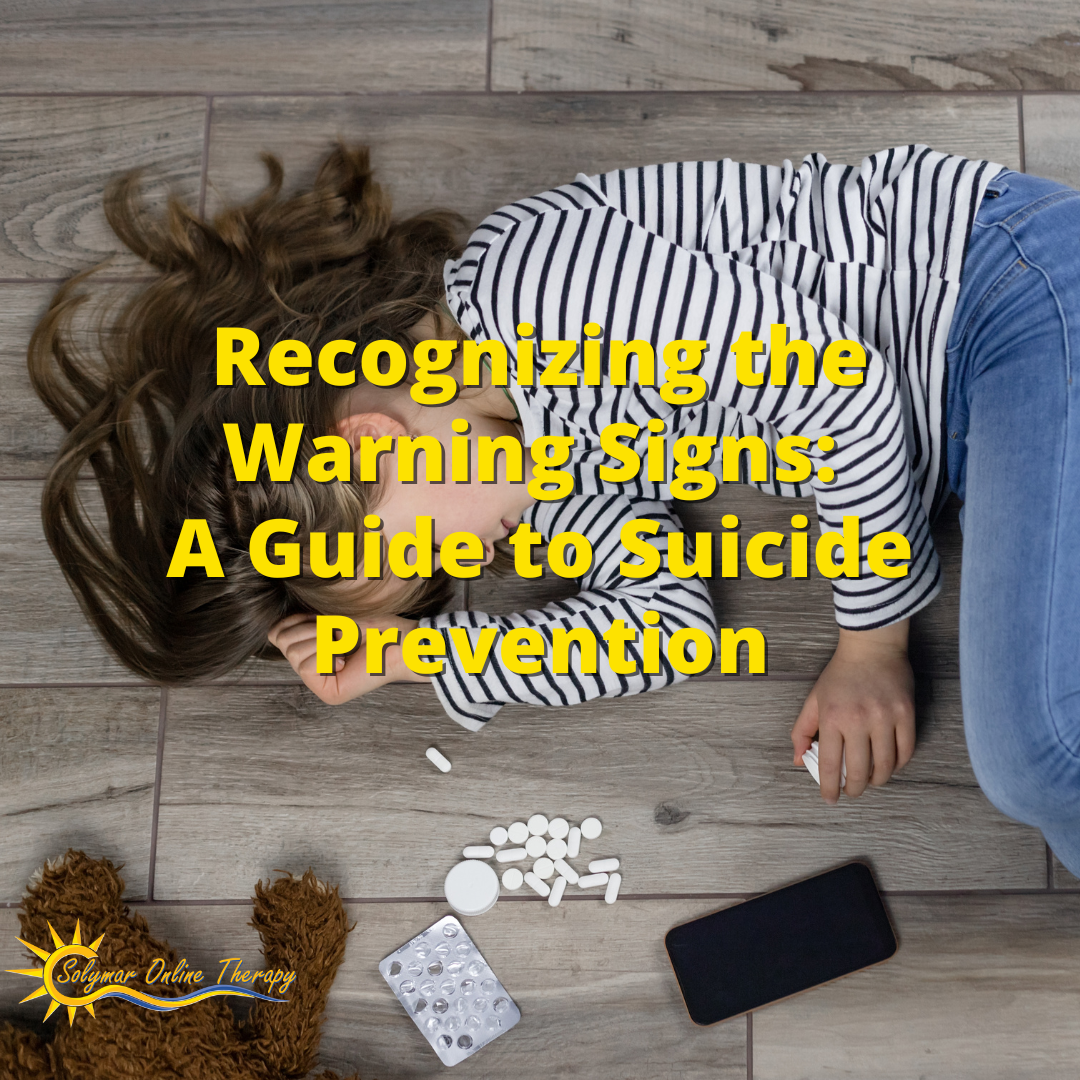 Suicide is a global public health concern that affects individuals of all ages, backgrounds, and walks of life. Recognizing the warning signs of suicide and knowing how to respond with care and support can be crucial in saving lives. In this comprehensive guide, we will explore the signs of suicidal thoughts in oneself or others, and highlight the role of therapy in suicide prevention.
Suicide is a global public health concern that affects individuals of all ages, backgrounds, and walks of life. Recognizing the warning signs of suicide and knowing how to respond with care and support can be crucial in saving lives. In this comprehensive guide, we will explore the signs of suicidal thoughts in oneself or others, and highlight the role of therapy in suicide prevention.
Understanding the Warning Signs
-
Expressing Suicidal Thoughts: Someone experiencing suicidal thoughts may directly or indirectly express their feelings of hopelessness, despair, or a desire to end their life. Statements like "I can't take it anymore" or "I wish I wasn't here" should never be ignored.
-
Withdrawal and Isolation: People at risk of suicide may withdraw from friends, family, and social activities. They might isolate themselves, avoiding contact with others and becoming increasingly distant.
-
Drastic Mood Swings: Severe changes in mood, such as sudden and intense episodes of sadness, anger, or irritability, could be indicative of underlying emotional distress.
-
Giving Away Possessions: Individuals contemplating suicide might give away their possessions or make arrangements as if they won't be around much longer.
-
Engaging in Risky Behaviors: Reckless behavior, substance abuse, or a sudden disinterest in personal safety might signal a cry for help.
-
Talking about Death or Dying: Frequent discussions about death or dying, whether explicitly or indirectly, could be a sign of their inner turmoil.
-
Drastic Changes in Sleep and Appetite: Insomnia, hypersomnia, loss of appetite, or overeating may be signs of emotional distress.
-
Loss of Interest: A sudden loss of interest in activities they once enjoyed might indicate emotional struggles.
How to Offer Support
If you suspect someone might be struggling with suicidal thoughts, it's essential to approach the situation with empathy, compassion, and genuine concern. Here's how you can offer support:
-
Initiate a Conversation: Find a private and comfortable setting to talk openly. Express your concern and willingness to listen without judgment.
-
Active Listening: Be an attentive listener and allow them to share their feelings without interruption. Validate their emotions and let them know you care.
-
Avoid Minimizing Their Feelings: Never downplay their emotions or tell them that "it's not that bad." What they are going through is valid and real to them.
-
Ask Directly About Suicidal Thoughts: While it may be difficult, asking directly if they are thinking about suicide can be crucial. It shows that you are willing to address the issue openly.
-
Encourage Professional Help: Suggest reaching out to a mental health professional or therapist who can provide specialized support.
-
Stay Connected: Offer your ongoing support and keep in touch regularly. Let them know they are not alone in their struggles.
-
Involve Trusted Individuals: If appropriate and with their consent, involve other trusted friends or family members who can provide additional support.
The Role of Therapy in Suicide Prevention
Therapy plays a vital role in suicide prevention, both in the immediate crisis and in the long-term recovery process. Mental health professionals are trained to assess suicide risk and provide evidence-based interventions. Here's how therapy can help:
-
Safety Assessment: Therapists can conduct a thorough assessment of the individual's safety, determining the level of suicide risk and taking appropriate actions to ensure their immediate safety.
-
Crisis Intervention: In moments of acute crisis, therapists can provide immediate support, helping the individual cope with overwhelming emotions and providing alternative coping strategies.
-
Addressing Underlying Issues: Therapy can help identify and address the underlying factors contributing to suicidal thoughts, such as depression, anxiety, trauma, or substance abuse.
-
Cognitive-Behavioral Techniques: Cognitive-behavioral therapy (CBT) can help individuals challenge negative thought patterns and develop healthier coping mechanisms.
-
Building Resilience: Therapy can empower individuals by teaching them skills to manage stress, improve problem-solving, and enhance emotional resilience.
-
Providing a Safe Space: Therapy offers a confidential and non-judgmental environment for individuals to express their feelings without fear of rejection or stigma.
Where to Seek Help
If you or someone you know is experiencing suicidal thoughts or struggling with mental health issues, know that help is available. Reach out to the following resources:
-
Emergency Services: In an immediate crisis, call emergency services or go to the nearest hospital.
-
Helplines: Helplines such as Samaritans (116 123) and Shout (text "SHOUT" to 85258) offer confidential support 24/7.
-
Online Therapy Services: Online therapy platforms provide accessible and confidential mental health support from licensed professionals.
-
Local Mental Health Services: Contact local mental health clinics or organizations for in-person support.
Conclusion
Recognizing the warning signs of suicide and responding with care and support can make a significant difference in saving lives. By fostering open conversations and breaking the stigma surrounding mental health, we create a supportive environment where individuals feel safe seeking help. Therapy, with its professional guidance and evidence-based interventions, plays a crucial role in suicide prevention, offering hope and healing to those in need. Remember that reaching out for help is a sign of strength, and no one has to face their struggles alone. Together, we can make a difference in suicide prevention and support one another on the journey towards mental well-being.
Hashtags: #SuicidePrevention #MentalHealthMatters #BreakTheStigma #CompassionateSupport #TherapyForHope #SuicideAwareness #MentalWellbeing #SupportForLife #OnlineTherapy #SaveLives
Suicide Help
Suicide Help Lines
![UK Suicide Help Lines]() UK
UK
Here are some UK-based helpline numbers and resources that individuals can reach out to for immediate support if needed:
-
Samaritans Helpline: 116 123 Website: www.samaritans.org
-
Mind Infoline Helpline: 0300 123 3393 Text: 86463 Website: www.mind.org.uk
-
CALM (Campaign Against Living Miserably) Helpline: 0800 58 58 58 Website: www.thecalmzone.net
-
PAPYRUS (Prevention of Young Suicide) Helpline (for under 35): 0800 068 41 41 Website: www.papyrus-uk.org
-
The Mix (for under 25) Helpline: 0808 808 4994 Website: www.themix.org.uk
-
Rethink Mental Illness Helpline: 0808 801 0707 Website: www.rethink.org
-
YoungMinds (for parents concerned about their child's mental health) Helpline: 0808 802 5544 Website: www.youngminds.org.uk
-
Childline Helpline: 0800 1111 Website: www.childline.org.uk
Remember, if you or someone you know is in immediate danger or requires urgent medical attention, please call 999 or go to the nearest hospital emergency department.
These helplines and resources are staffed by trained professionals who can provide confidential support, guidance, and a listening ear to those experiencing emotional distress, including thoughts of suicide. It's crucial to reach out for help when needed, and these organizations are there to offer support 24/7.
![Canada Suicide Help Lines]() CANADA
CANADA
Here are some Canadian-based helpline numbers and resources that individuals can reach out to for immediate support if needed:
-
Canada Suicide Prevention Service Helpline: 1-833-456-4566 Website: www.crisisservicescanada.ca
-
Crisis Text Line Canada Text: CONNECT to 686868
-
Kids Help Phone (for youth under 20) Helpline: 1-800-668-6868 Website: www.kidshelpphone.ca
-
First Nations and Inuit Hope for Wellness Help Line Helpline: 1-855-242-3310
-
Trans Lifeline Helpline: 1-877-330-6366 Website: www.translifeline.org
-
Canadian Mental Health Association (CMHA) Crisis Line Check your local CMHA branch for the helpline number.
-
Crisis Services Canada Helpline: 1-833-456-4566 Text: 45645
-
Distress Centres of Greater Toronto Helpline: 416-408-4357 Text: 45645
These helplines and resources provide confidential support and assistance to individuals in Canada who may be experiencing emotional distress, suicidal thoughts, or other mental health challenges. Trained professionals are available to offer help 24/7, ensuring that those in need have access to immediate support and someone to talk to during difficult times.
As with any crisis situation, if you or someone you know is in immediate danger or requires urgent medical attention, please call 911 or go to the nearest hospital emergency department.
![US Suicide Help Lines]() USA
USA
Here are some USA-based helpline numbers and resources that individuals can reach out to for immediate support if needed:
-
National Suicide Prevention Lifeline Helpline: 1-800-273-TALK (1-800-273-8255) Website: www.suicidepreventionlifeline.org
-
Crisis Text Line Text: HOME to 741741 Website: www.crisistextline.org
-
Veterans Crisis Line Helpline: 1-800-273-TALK (1-800-273-8255), press 1 Text: 838255 Website: www.veteranscrisisline.net
-
SAMHSA (Substance Abuse and Mental Health Services Administration) National Helpline Helpline: 1-800-662-HELP (1-800-662-4357) Website: www.samhsa.gov/find-help/national-helpline
-
National Alliance on Mental Illness (NAMI) Helpline Helpline: 1-800-950-NAMI (1-800-950-6264) Website: www.nami.org
-
TrevorLifeline (for LGBTQ+ youth) Helpline: 1-866-488-7386 Website: www.thetrevorproject.org
-
RAINN (Rape, Abuse & Incest National Network) National Sexual Assault Hotline Helpline: 1-800-656-HOPE (1-800-656-4673) Website: www.rainn.org
-
National Domestic Violence Hotline Helpline: 1-800-799-SAFE (1-800-799-7233) Website: www.thehotline.org
These helplines and resources offer confidential support and help to individuals in the USA who may be experiencing emotional distress, suicidal thoughts, or dealing with mental health and related issues. Trained professionals are available 24/7 to provide immediate assistance and a listening ear for those in need.
In case of a life-threatening emergency or immediate danger, please call 911 or go to the nearest hospital emergency room for immediate help.

 UK
UK CANADA
CANADA USA
USA




